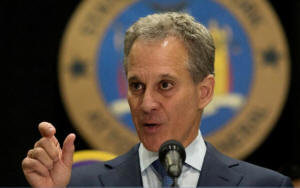|
Trump's opponents race to the courthouse
to thwart him
 Send a link to a friend
Send a link to a friend
 [November 02, 2017]
By Lawrence Hurley and Andrew Chung [November 02, 2017]
By Lawrence Hurley and Andrew Chung
WASHINGTON (Reuters) - When President
Donald Trump announced on Oct. 12 he would stop subsidies to health
insurers critical to the Obamacare law, the response from Democratic
state officials was swift and predictable: a lawsuit by 18 state
attorneys general was filed within 24 hours.
The race to the courthouse in response to presidential actions has
become a familiar pattern since Trump took office in January, and early
rulings in many of the lawsuits have, at least temporarily, hobbled key
parts of the president's agenda.
Many of the Republican president's most significant executive actions,
in areas from immigration and transgender rights to energy and the
environment, have been impeded by court rulings in cases brought by
Democratic state and local officials as well as liberal advocacy groups.
"We are more of a check on this administration than Congress,"
Democratic New York state Attorney General Eric Schneiderman said of
state attorneys general.

Similarly, important executive actions taken by Trump's Democratic
predecessor Barack Obama were stymied by lawsuits filed by Republican
state attorneys general, including one eventually decided by the Supreme
Court that was intended to protect millions of immigrants in the country
illegally from deportation.
Since Trump took office, courts have at least temporarily blocked
Trump's plans to:
* ban travelers and immigrants from several Muslim-majoritycountries *
withhold federal funds from so-called sanctuary citiesthat refuse to
cooperate with federal authorities on immigrationenforcement * ban
transgender people from serving in the military[L2N1N518M] * delay
implementation of a regulation issued by the Obamaadministration
limiting methane emissions * put the brakes on an Interior Department
rule requiringenergy firms to pay more mineral royalties on federal land
* delay compliance with an Obama-era rule aimed at curbingnatural gas
drilling waste emissions on federal land * and impede a detained illegal
immigrant teenager fromobtaining an abortion
Trump has claimed some court victories, too, including on Oct. 25 when a
federal judge in California refused the request by the state attorneys
general to force the government to keep the subsidies to insurers under
Obamacare, formally known as the Affordable Care Act, in place as the
litigation proceeds. That decision was more the exception than the rule.
"President Trump remains committed to protecting our national security
and to eliminating excessive regulations that, if implemented, would
destroy jobs, harm consumers and provide no meaningful benefit," a White
House official, speaking on condition of anonymity, said in a statement
provided to Reuters. "The Trump administration is confident in its legal
positions and looks forward to arguing -- and winning -- before the
federal judiciary," the official added.

CRITICISM OF JUDICIARY
In response to legal setbacks, Trump has lashed out at the judiciary in
ways that even his own Supreme Court appointee Neil Gorsuch called
disheartening and demoralizing. Trump called U.S. courts "so political,"
labeled various rulings and proceedings "ridiculous" and "disgraceful,"
and disparaged one jurist who ruled against him as a "so-called judge."
While presidents often face legal challenges over policy initiatives,
Trump's administration stands out for the number of suits it has
encountered so soon after taking power.
Trump has faced far more litigation than Obama had at this stage of his
presidency. A review of legal database Westlaw showed that in Trump's
first nine months in office, cities or states filed 24 lawsuits
challenging major policy initiatives of the administration. The review
showed no similar lawsuits during the same time period of Obama's
presidency.
Trump also faces numerous suits by advocacy groups and others
challenging such actions as his termination of an Obama program that
protected people brought into the United States illegally as children
from deportation and the authority of a presidential commission formed
to investigate alleged voter fraud.
Trump has relied heavily on unilateral executive actions to advance his
policy objectives. His fellow Republicans who control Congress have been
unable to pass any major legislation he has sought.

[to top of second column] |

New York Attorney General Eric T. Schneiderman announces the filing
of a multistate lawsuit to protect Deferred Action for Childhood
Arrivals (DACA) recipients at a press conference at John Jay College
in New York City, U.S. on September 6, 2017. REUTERS/Joe Penney/File
Photo

Executive actions can be challenged in court more quickly than
lengthy federal rule-making procedures, said law professor Jonathan
Adler of Case Western Reserve University School of Law.
Obama relied on executive actions during the later years of his
presidency after being unable to win congressional approval of key
initiatives, and some of those actions drew legal challenges. But
early in his presidency, he relied on unilateral actions less often
because his fellow Democrats controlled Congress and passed major
legislation including the 2010 Obamacare law.
'SHOOT FROM THE HIP'
Some legal experts say the haste with which Trump drafted some of
his policy initiatives may have helped those challenging the actions
because the orders were not sufficiently vetted.
"This administration is more willing to shoot from the hip" when
compared with the Obama administration, Adler said.
That is how San Francisco City Attorney Dennis Herrera, a Democrat,
saw Trump's executive order on sanctuary city funding, which Herrera
calculated could jeopardize up to $2 billion in federal funds for
his city.
Herrera said he saw Trump's action as "designed to appeal to a part
of the administration's political base without really having been
vetted" by lawyers to ensure it was legally airtight. Herrera won an
initial ruling in April blocking the measure, and the case is now
pending before an appeals court.

Trump's actions have appealed to his conservative political base,
while the legal challenges have pleased his liberal critics.
Speaking at an event at New York University, Schneiderman, New
York's attorney general, called Trump's first travel ban, signed in
January just a week into his presidency, a "galvanizing moment" for
Democratic officials.
While lawsuits challenging the president's actions have won some
important early victories, the litigation onslaught's ultimate
effect on Trump's agenda is not yet clear.
Trump's opponents have tended to file suits in jurisdictions where
they think they are likely to prevail, and where appeals will be
heard in regional federal circuit courts dominated by
Democratic-appointed judges.
The final decisions on the cases could be made by the Supreme Court,
where Trump's appointment of Gorsuch restored a 5-4 conservative
majority.
The high court is likely to "prove more receptive" to the
administration's arguments on issues like immigration, said George
Washington University Law School professor Jonathan Turley.
Last week, a federal judge in San Francisco who was appointed by
Obama appeared skeptical in a hearing about the challenge by the 18
states to the Affordable Care Act subsidies, illustrating the limits
of resistance through litigation.

Alluding to the political aspect of the case, U.S. District Judge
Vince Chhabria asked rhetorically during a hearing: why "have all
these attorneys general rushed to court seeking an emergency ruling
against President Trump?" Chhabria then ruled in favor of Trump.
Follow Trump's impact on energy, environment, healthcare,
immigration and the economy at The Trump Effect
(Reporting by Lawrence Hurley and Andrew Chung; Editing by Sue
Horton and Will Dunham)
[© 2017 Thomson Reuters. All rights
reserved.]
Copyright 2017 Reuters. All rights reserved. This material may not be published,
broadcast, rewritten or redistributed. |